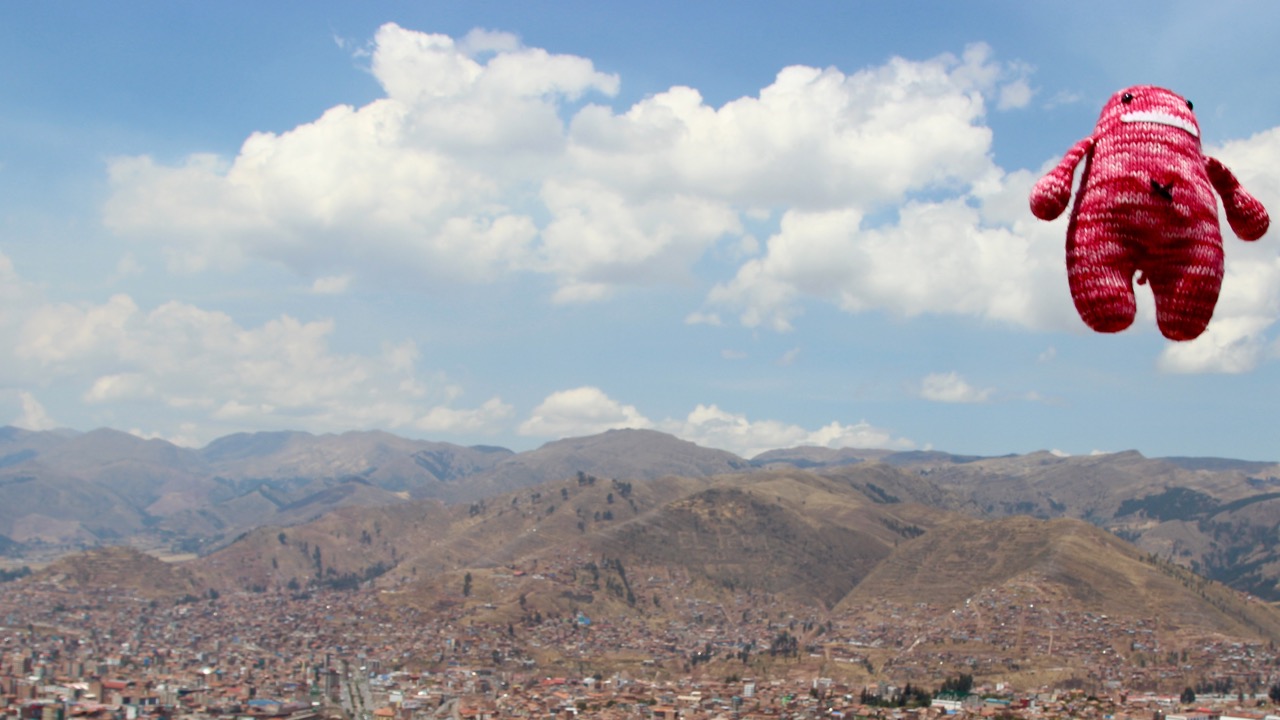Day three of exploring in full sun at high altitudes marks a third day of a sunburned scalp and a third day of changing the way I part my hair to not expose a sunburned scalp. I have learned that this makes brushing my dry, sad hair incredibly painful.
Tomorrow, I will invest in a sunhat.
This morning was sunny and the rest of the day had rain in the forecast, so we headed out to explore Cusco’s central plaza and the Inca ruins north of town, Saksaywaman.

Cusco has boomed as a tourist town. It is the gateway for many to Machu Picchu and it is in the center of the Sacred Valley. Many of the streets are uneven cobblestone, and there is much original Inca stonework remaining. The town swarms with tourists, touts, and alpacas.

Plaza de Armas
Shops in the town square have small, tasteful signs – we noted a starbucks and a KFC, and there’s a McDonald’s nearby, too. Shamelessly I got some Starbucks.
The plaza is crowned by a magnificent cathedral, and the town plaza features a giant golden inca statue. The surrounding mountains roll up and away in the background.


We opted for a walking tour of the cobblestone streets, up to Saksaywaman. Had we attempted this hike a few days ago, we would have probably fallen over dead from lack of oxygen. Walking around in Cusco feels easier than it was in Puno – it’s at a lower elevation, and we’ve been here for a few days now. We took these stairs and hills like champs.
We chugged up and down narrow, cobblestone streets. We passed many other tourists on the same odd back streets we were on, which was part of a walking tour from our book. Saksaywaman stands 1000 feet above the town of Cusco. I stomped on a lot of steps.

Saksaywaman (Say it with me – sexy woman!)
We were both rewarded for not dying on the city streets by yet another climb up to the monument itself. Long ago, Cusco was in the shape of a puma, and the Inca Emperor Pachacutec designed Saksaywaman to be the head of the puma.
Many of the buildings that stood on the grounds of the fort were torn down long ago to build houses down in the central city. Only about 30% of the original site remains.
The perfectly-carved Inca stonework provides the base of the fort. No mortar goes into the making of the Inca walls. Experts theorize that each rock was uniquely carved to fit in just the spot it was placed, with the other stones around it. These walls have withstood earthquakes for centuries.

We climbed all over the fort, exploring the barracks, parade grounds, and rocks that looked like slides. Because we are bad at turning around, we missed the amphitheater, but we did get to see that later on via bus.
From one side of the fort, you could see nearly the entire city – down into the central plaza, out to the airport and stadium, and to the mountains beyond.


Much of the fort is roped off into a path you need to follow, and you can’t explore all the staircases and curves, but there are areas where you can be dwarfed by the magnificent stonework.
The slides were on the hill opposite the fort and parade grounds. I wanted to sit on one, but they were pretty slick and I am a master at tripping and falling on my face (I once tried to vault over the side of a convertible with its top down to land awesomely in my seat and I only succeeded in landing on my face)…so I avoided sliding on them.

After an amazing lunch of a gigantic, spicy alpaca burger in a weirdly American-style sports bar, we hopped on a tour bus of the city.

The tour bus took us around many different famous buildings in Cusco. We spent an annoyingly long amount of time at a souvenir shop up near Saksaywaman, but it was a good way to see some of the sights that would have been hard to see on foot.

Tomorrow, we get up incredibly early to go to Poroy station – it’s off to Machu Picchu for us!

